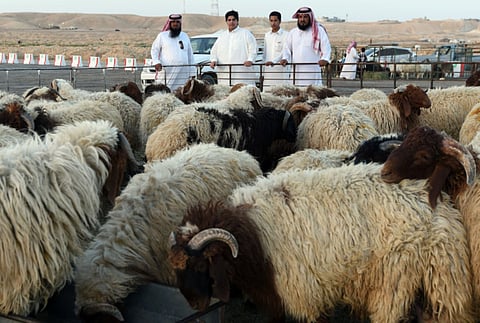98,000 pilgrims barred from Haj
Authorities apply zero-tolerance policy towards attempts not to abide by regulations

Manama: Saudi Arabia has so far barred 98,000 would-be pilgrims from reaching Makkah after they failed to show the documents that would allow them to enter the sacred city in the western part of the kingdom during the Haj season.
No one, including Saudi nationals and expatriates living in Saudi Arabia, is allowed into the city to perform Haj if they are not registered with accredited Haj operators and do not have the permits required by the authorities. A tight cordon is established around the city to ensure there is no breakthrough.
More than 1.4 million foreign pilgrims, about one-fourth of whom are from the Indian sub-continent, will perform Haj this year, Saudi Arabia’s Haj Minister said on Tuesday ahead of the world’s largest annual gathering.
Despite the cordon and the regular warnings, thousands of people without proper papers invariably attempt to push their luck and way into the city, often by taking rugged dirt roads and through hills. However, the security servicemen often catch them and bar them from entering.
The interior ministry on Monday said that it has so far forced 25,216 vehicles that were not licenced to carry pilgrims to go back.
The scrutiny of the valid permits for would-be pilgrims for those arriving by air is carried out at the airport and scores of those who did not have the proper documents were this year told to fly back home. Many of them complained that they had been duped by unscrupulous Haj operators who had promised them that all papers were in order, but discovered at the Saudi airport that they did not have the required permit.
The Saudi authorities decision to allow only those with valid documents is based on security and organisational concerns related to the large crowds expected to congregate in the area.
Although Saudi authorities have improved the mass movement of around three million people in a tight area during the Haj, making it faster and smoother, they still have to face formidable challenges posed by people not abiding by the regulations.
Several Saudis and expatriates try to take advantage of the Haj season to make money by making false promises to trusting people keen on performing Haj or by offering “secret passages” to the holy sites to those who are not registered with a Haj operator.
Last year, a 300-kilometre security cordon was established around Makkah to keep away infiltrators.
The cordon included 30 fixed checkpoints and 50 mobile patrols and a special support force of 200 members was on permanent standby for emergency cases.
This year, pilgrims will congregate on Mount Arafat in the outskirts of Makkah on Friday for a day of prayer and supplication. Eid Al Adha, the Feast of the Sacrifice, will be celebrated on Saturday
Haj, the fifth and last pillar of Islam, requires all physically fit and financially able Muslim men and women to perform Haj at least once in their lives.
— with inputs from PTI



